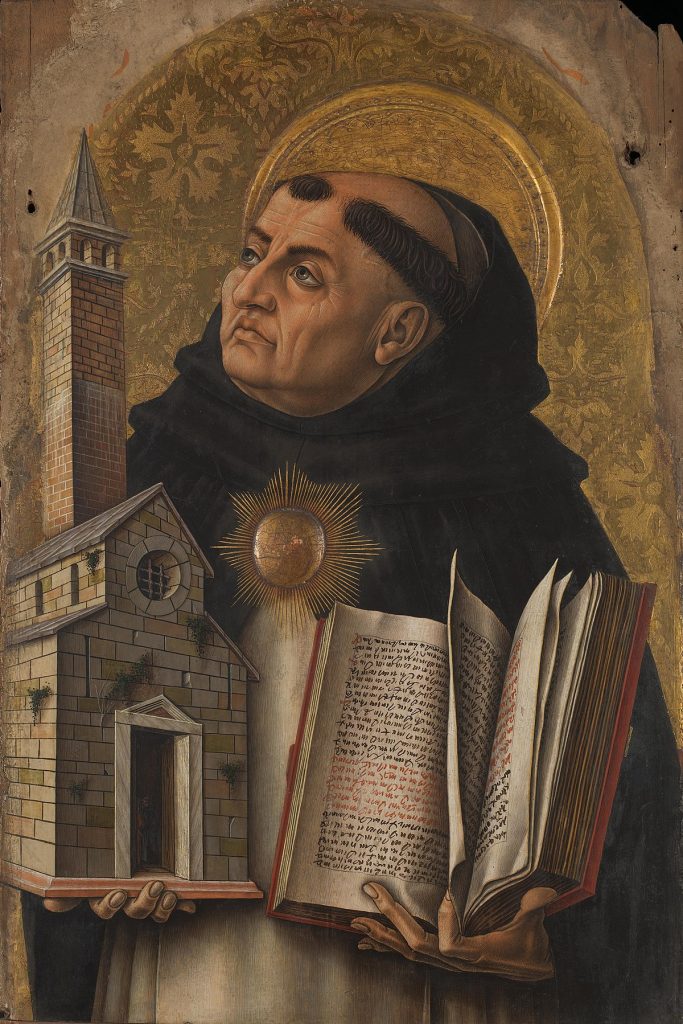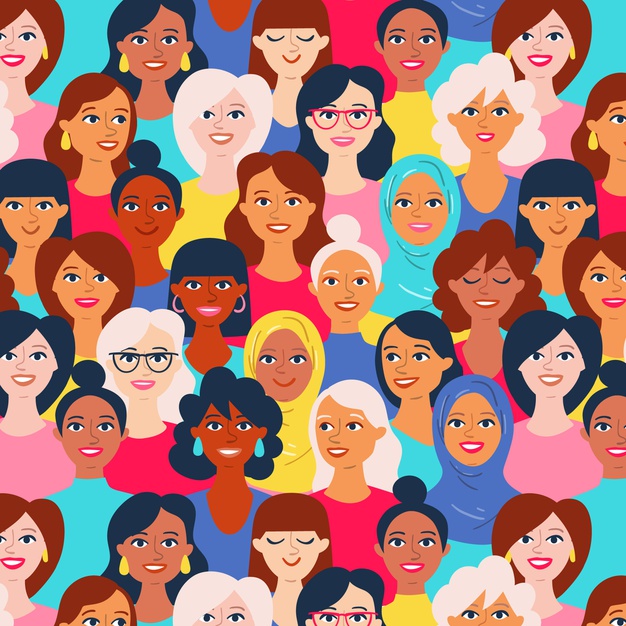In this section, we will review a part of the third meeting of strategic thoughts on the topic of women and family, referring to the rich and pure foundations of the Islamic religion in contrast to the western and eastern readings of the identity, rights, and personality of women.
In this meeting, Iran’s Leader discussed some basic points about the comparison of women in Iran and Islam with women in Western and Eastern ideologies.
Regarding this matter, and in the case of “theoretical approaches in the field of women”, as follows we have an article from an expert in women’s studies:
1- Woman in the eyes of Thomas Aquinas, the philosopher of Rome

“Man is the beginning and end of a woman”, this a quote from Thomas Aquinas, who is known as the “ecumenical” of Roman Catholic Christianity. As a great philosopher and leader of Western society, referring to the story of creation in the Bible, he firmly states that men are the “beginning and completion” of women, and that women have some kind of deficiency and lack of success, and he has been quoted many times that woman is a human being who It is inherently incomplete and unsuccessful.
Following Aristotle, he considered the birth of a girl to be caused by the weakness of male reproductive power and said that this weakness causes a “defective” human being to be born. He considered women to be lower than slaves and believed that women should be held according to the law of nature. They all should be obedient and submissive.
2- Women’s right to education in Britain
Until 1947, in Britian, women who were studying were not given degrees because they believed that women should not gain any academical certification, and one of the elderly women who had such high educational knowledge that she was worthy of a PHD, due to the regulations of the time she never succeeded in getting her certificate.
This happened at the same time when in Iran, Madam Amin Esfahani had the permission of ijtihad(PHD in Seminary studies) from the first-rank seminary scholars of that era in Islam, and in Isfahan_ Iran, she held a field of teaching philosophy and jurisprudence. (1)

3- Property ownership and citizenship rights of women in different countries
In European countries, until the mid 1900’s, the shadow of guardianship laws in Europe was heavy. They deprived women from having rights such as property ownership, wages, and inherited wealth; they were all subjected to give it to their husbands (or other men of the family). In fact, all the property of a woman became the property of a man; women were all isolated and could not enter a financial contract with anyone.
Even in a country like France, women did not have the right to have bank accounts until about a century ago, and this right was granted to women in 1881, and five years later, married women were also allowed to open bank accounts without the permission of their husbands ( or other women in their family).
England did not allow women to do so until 1975, and the United States denied women access to bank accounts until the 1960s. According to the law passed by the British National Assembly in 1850, women were not considered citizens of the country.
In Greece, a few decades ago, it was not possible for women to file a lawsuit in court: “You see that in the Western goverments and other European countries, which claim to defend women’s rights (which are almost all lies) until the first decades of this century, women not only did not have the right to vote, not only did they not have the right to say and choose, they also did not have the right to own property; That is, the woman was not allowed to own her inherited property, her property belonged to her husband! (2)
4- The definition of woman in the works of Jean-Jacques Rousseau
In two books, “Emile” and “The Social Contract”, Jean-Jacques Rousseau sees a woman as a creature without understanding and intellect also unfit to raise a child and only a cause to give pleasure to a man. He doesn’t even believe that men are better at raising children than women, but he believes that women are generally not capable of raising children.
Whenever Rousseau talks about youth, he addresses only the male gender and does not see women as worthy of work and employment, and ultimately believes that women are created only to be accepted by men, and women are created to serve men. . (3)
5- Representation of the female character in Shakespeare’s plays
In one of his speeches, referring to the low graded view of women, Iran’s Leader says: “Taming the rebellious woman” is one of those valuable plays. In this play, from Shakespeare’s point of view, all the value and importance of a woman is to be submissive and a slave to a man.
It is good for women to read some of Shakespeare’s plays, if they haven’t read them, to see what a woman is in the eyes of Westerners!? From their point of view, a man is a woman’s master! In this Othello play, who is Othello?
Othello is a black man of no origin, and his counterpart in this play is an aristocratic lady named Desdemona. The woman is an aristocratic and beautiful lady and the man is a stodgy black man who is skilled in war and is a good soldier. As soon as the black Othello and the aristocratic Desdemona get married, the woman must call him “my lord”. Also, a man has the right to strangle a woman with his own hand whenever he has the desire to.
6- The confrontation between Othello and Joyber in dealing with women
There is a narrative in Islamic stories, similar to the story of Othello; where a black slave that has no wealth or beauty named “ Juyber” gets married to woman of nobility. However, there are some important differences here.
When that woman becomes Juyber’s wife, the husband does not become “her master”. In “Othello”, the man is considered the woman’s “lord” . See this attitude towards women! In that woman’s point of view, all her worth is to be a sincere and obedient slave to her husband. These show the real ideology of Westerners about women and its despicable!” (4)
7- Laws of Jews and Christians for women
There are laws in the holy books of Christianity and Judaism that show the position of a woman in their society:
Every day a Jewish man whispers in his prayer: “Thank you God that I was not created a woman”, or for example a man can sell his daughter for a loan he has taken, but he cannot force her into prostitution or other similar cases. The status of a woman is lower than her husband and it is the man who has the right to rule over her.(5) Christian and Jewish women have been faced with these kinds of teachings since childhood and this view of being a woman; and this sort of ideology has uprised crisises of women that face everyday in Western countries.
Women who distanced themselves from their divine self, and this distance caused them to forget and ignore their inherent human dignity, created confusion within them, and led to an epochal crisis and became the foundation of other problems and harms for them.
Women who felt inferior inside and did not feel safe and respected in society and family. the result of not feeling safe and humiliated; It is a rebellion in which the western woman struggles today. A woman who suffers from self-alienation and is poisoned by distorted and anti-woman thoughts and tries to spread it to others in order to escape from this poisoning.

8-Islam’s view of men and women
On the other hand, we have the Islamic view of women, which Iran’s Leader explains: “Islam’s view is that men and women are equal in terms of human values”.
Surat Al-Ahzab, verse 35: “For Muslim men and women,- for believing men and women, for devout men and women, for true men and women, for men and women who are patient and constant, for men and women who humble themselves, for men and women who give in Charity, for men and women who fast (and deny themselves), for men and women who guard their chastity, and for men and women who engage much in Allah’s praise,- for them has Allah prepared forgiveness and great reward.”
A Muslim man and a Muslim woman do not differ from each other in terms of divine and human values. They both have common duties; in all cultural, political, economical and social fields.
This is the view of Islam and the Islamic Republic towards women, and we are proud of it; We protest the western logic, method and lifestyle regarding women; We believe that it is them who they are oppressing women.” (6)
Sources:
1) Ayatollah Khamenei, 3rd June 1997
2) Ayatollah Khamenei, 30th June 1997
3) Seyyed Khodayar Mortazavi, Shahindokht Pakzad: language, women and discursive duality in Rousseau’s political thought (2015)
4) Ayatollah Khamenei, 29th January 1992
5) Seyedeh Mozhgan Sakhai, Finding the Roots of the Women’s Crisis in the West by Relying on the Teachings of the Bible, (2019)
6) Ayatollah Khamenei, 15th January 2019

